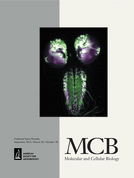 An investigation at the University of Florida has led to the retraction of a pair of papers on the stress responses of Caenorhabditis elegans in Molecular and Cellular Biology.
An investigation at the University of Florida has led to the retraction of a pair of papers on the stress responses of Caenorhabditis elegans in Molecular and Cellular Biology.
One paper has been retracted, and one “partially” retracted, as the main conclusion was “not compromised.” According to the retraction notes, the investigation found the data were “falsified” by first author Chi Leung, a former postdoc at UF.
Here’s the note in full for the partial retraction of “A Negative-Feedback Loop between the Detoxification/Antioxidant Response Factor SKN-1 and Its Repressor WDR-23 Matches Organism Needs with Environmental Conditions:”
The results of an investigation initiated by the corresponding author and conducted at the University of Florida found that data in Fig. 1F and 6A, D, and E were falsified by the first author. The falsified data have two main scientific consequences. First, they compromise our conclusions that skn-1 controls wdr-23mRNA levels and negative feedback controls detoxification gene mRNA levels in wild-type worms under basal conditions (see the end of the first paragraph in column 2 of p. 3531 and Fig. 6A). Second, they misrepresent differences in gst-4 induction between worms with the wild-type and mutated wdr-23 promoter at two concentrations of acrylamide tested (Fig. 6E and F at 0.875 and 7.0 mM); as a result, there is no longer support for interaction 3 of the model in Fig. 8. The falsifications in Fig. 1F and 6D were inconsequential to the conclusions of the study. To our knowledge, other conclusions are not compromised by these findings of falsification, including the central conclusion of negative feedback via a direct interaction between SKN-1 protein and the wdr-23 promoter, which has been confirmed independently of the first author. Therefore, we partially retract the paper. We sincerely apologize to the scientific community for any time and effort wasted because of these actions.
The paper has been cited four times, according to Thomson Scientific’s Web of Knowledge.
And here’s the note for “Direct Interaction between the WD40 Repeat Protein WDR-23 and SKN-1/Nrf Inhibits Binding to Target DNA:”
The results of an investigation initiated by the corresponding author and conducted at the University of Florida found that data in Fig. 6F were falsified by the first author. Given that one of our central conclusions concerning the ability of WDR-23 to block DNA binding by SKN-1 was based on these results, we retract the article. We emphasize that we have been able to confirm that WDR-23 preferentially interacts with the SKN-1c variant (as depicted in Fig. 1), that the top of many WDR-23 blades are required for the interaction with SKN-1 (as depicted in Fig. 3 and 4), and that the N-terminal GLRWRD domain of SKN-1c is required for the interaction (Fig. 3F and 5B to C). We are currently working to properly map the WDR-23 interaction domain within SKN-1c and identity biochemical mechanisms of regulation. We sincerely apologize to the scientific community for any time and effort wasted because of these actions.
The paper has been cited twice.
The Scientist, which first reported the story, spoke to Janine Sikes at the University of Florida press office:
In an email to The Scientist, Sikes said that the investigation is ongoing and that Leung is no longer at the university.
We reached out to Leung via a gmail address that we found for him, and will update if he gets back to us.
Hat tip: Rolf Degen and The Scientist
Like Retraction Watch? Consider making a tax-deductible contribution to support our growth. You can also follow us on Twitter, like us on Facebook, add us to your RSS reader, and sign up on our homepage for an email every time there’s a new post. Click here to review our Comments Policy.
It seems to me that there are an awwwwful lot of retirees out there who have time on their hands who could be a resource for peer review